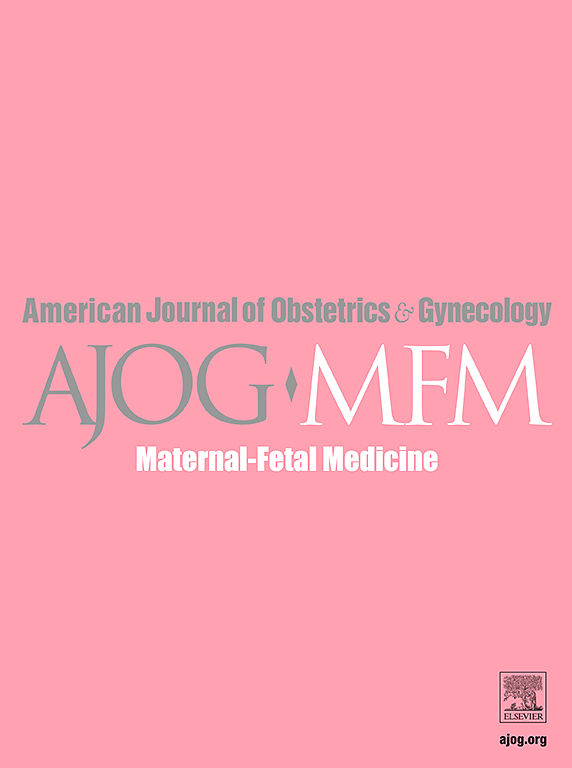围产期抑郁症状与儿童神经发育之间的关系。
IF 3.8
2区 医学
Q1 OBSTETRICS & GYNECOLOGY
American Journal of Obstetrics & Gynecology Mfm
Pub Date : 2024-09-16
DOI:10.1016/j.ajogmf.2024.101488
引用次数: 0
摘要
背景:围产期抑郁症被认为会对儿童的神经发育产生不利影响。然而,幼儿期环境的复杂性给研究结果带来了挑战:研究设计:研究设计:一项针对亚临床甲状腺功能减退症孕妇的甲状腺素治疗多中心随机试验的辅助研究的二次分析。研究对象包括在孕期和产后完成流行病学研究中心抑郁(CES-D)筛查并在5岁时完成儿童神经发育测试的婴儿和分娩父母(人数=209)。CES-D 筛查分别在怀孕 11-20 周、34-38 周和产后一年进行。抑郁症状分为产前(即孕期任何时候筛查呈阳性)和产后两种。主要结果是儿童在5岁时通过韦氏学前和小学智力量表III(WPPSI-III)全量表测试获得的智商分数小于85分。次要结果包括对儿童神经发育的其他评估。研究采用了双变量分析和多变量逻辑回归:在纳入的 209 名产妇中,有 72 人(34%)在怀孕期间筛查出抑郁阳性,32 人(15%)在产后一年筛查出抑郁阳性。产前抑郁筛查呈阳性者所生子女的智商结论几率更高:在控制了包括社会健康决定因素在内的协变量后,围产期抑郁筛查呈阳性与儿童认知结果无关。本文章由计算机程序翻译,如有差异,请以英文原文为准。
The association between perinatal depressive symptoms and child neurodevelopment
Background
Perinatal depression has been suggested to adversely impact child neurodevelopment. However, the complexity of the early childhood environment challenges conclusive findings.
Objective
To evaluate whether there is an association between perinatal depressive symptoms and child intelligence quotient (IQ) at 5 years of age.
Study Design
Secondary analysis of an ancillary study to a multicenter randomized trial of thyroxine therapy for pregnant individuals with subclinical hypothyroidism. Dyads of infants and birthing parent, with completed Center for Epidemiological Studies-Depression (CES-D) screens during pregnancy and postpartum and child neurodevelopment testing completed at five years of age (n=209) were included. CES-D screening was performed at 11–20 weeks, 34–38 weeks, and one-year postpartum. Depressive symptoms were categorized as antenatal (i.e., a positive screen at any point during pregnancy) or postpartum. The primary outcome was child IQ score < 85 at 5 years of age using the Wechsler Preschool and Primary Scale of Intelligence III (WPPSI-III) Full Scale test. Secondary outcomes included other assessments of childhood neurodevelopment. Bivariable analyses and multivariable logistic regressions were utilized.
Results
Of the 209 birthing people included, 72 (34%) screened positive for depression during pregnancy and 32 (15%) screened positive one year postpartum. Children born to individuals with a positive antenatal depression screen had a higher odds of IQ < 85 at 5 years of age compared with children born to individuals with a CES-D < 16 (35% vs. 18%, OR 2.4, 95% CI 1.2–4.7). Similar findings were seen for children born to individuals with a positive postpartum depression screen (47% vs. 21%, OR 3.3, 95% CI 1.5–7.3). These associations did not persist in multivariable analyses that controlled for social determinants of health and clinical characteristics (adjusted odd ratio [aOR] 1.4, 95% CI 0.7–3.1; aOR 2.1, 95% CI 0.9–5.1, for antenatal and postpartum depressive symptoms, respectively). Similar findings were observed for other adverse neurodevelopmental outcomes.
Conclusions
Having a positive perinatal depression screen was not associated with child cognitive outcomes after controlling for covariates including social determinants of health.
求助全文
通过发布文献求助,成功后即可免费获取论文全文。
去求助
来源期刊

American Journal of Obstetrics & Gynecology Mfm
Medicine-Medicine (all)
CiteScore
7.40
自引率
3.20%
发文量
254
审稿时长
40 days
期刊介绍:
The American Journal of Obstetrics and Gynecology (AJOG) is a highly esteemed publication with two companion titles. One of these is the American Journal of Obstetrics and Gynecology Maternal-Fetal Medicine (AJOG MFM), which is dedicated to the latest research in the field of maternal-fetal medicine, specifically concerning high-risk pregnancies. The journal encompasses a wide range of topics, including:
Maternal Complications: It addresses significant studies that have the potential to change clinical practice regarding complications faced by pregnant women.
Fetal Complications: The journal covers prenatal diagnosis, ultrasound, and genetic issues related to the fetus, providing insights into the management and care of fetal health.
Prenatal Care: It discusses the best practices in prenatal care to ensure the health and well-being of both the mother and the unborn child.
Intrapartum Care: It provides guidance on the care provided during the childbirth process, which is critical for the safety of both mother and baby.
Postpartum Issues: The journal also tackles issues that arise after childbirth, focusing on the postpartum period and its implications for maternal health. AJOG MFM serves as a reliable forum for peer-reviewed research, with a preference for randomized trials and meta-analyses. The goal is to equip researchers and clinicians with the most current information and evidence-based strategies to effectively manage high-risk pregnancies and to provide the best possible care for mothers and their unborn children.
 求助内容:
求助内容: 应助结果提醒方式:
应助结果提醒方式:


